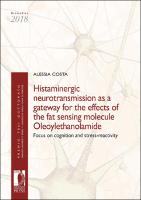Histaminergic neurotransmission as a gateway for the effects of the fat sensing molecule Oleoylethanolamide
Focus on cognition and stress-reactivity
Abstract
The histaminergic system is a pleiotropic system that commands general states of metabolism and consciousness, including learning and memorizing both pleasurable and aversive events. Brain histamine mediates the central effects of a signal molecule produced in the intestine, namely oleoylethanolamide (OEA). OEA is released by the enterocytes in response to high fat intake and reduces eating, by indirectly activating a subpopulation of histaminergic neurons. In her thesis, she explored other potential interactions between these two systems in the pursuit of unexplored neuronal mechanisms that may shed light on the mode of action of psychoactive agents and possibly lead to the development of new drugs.


 Download
Download Web Shop
Web Shop